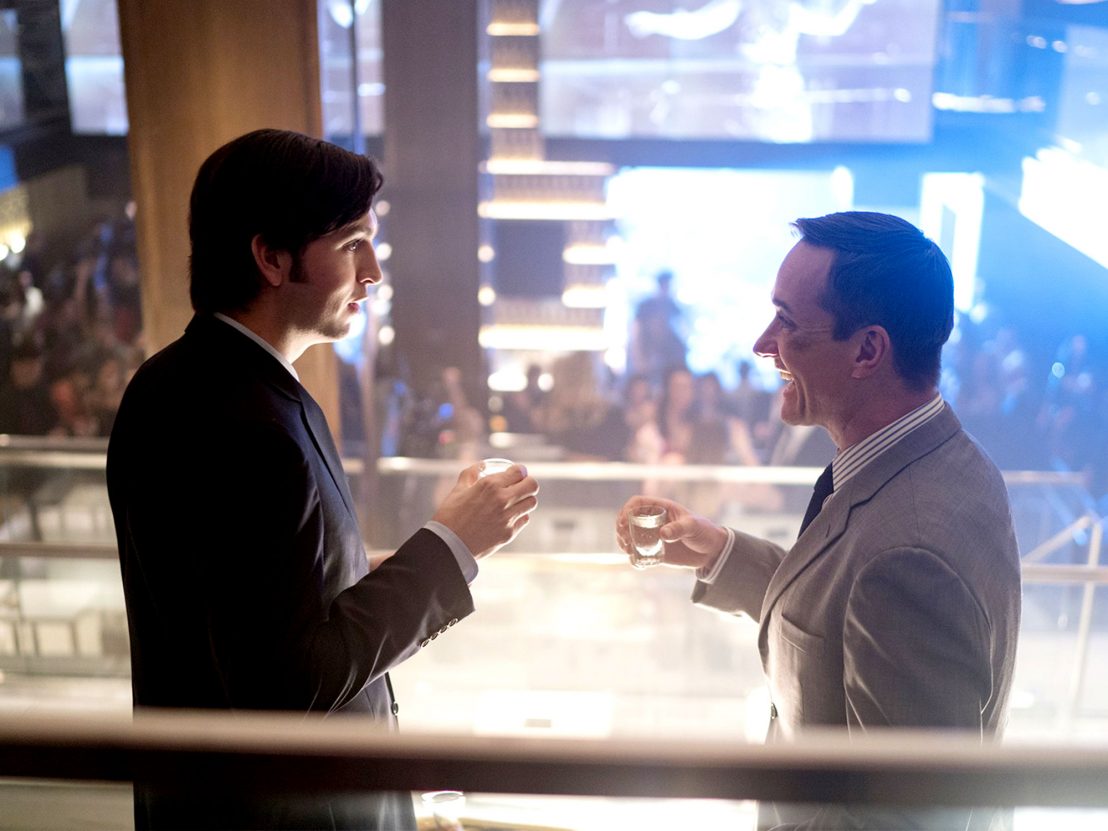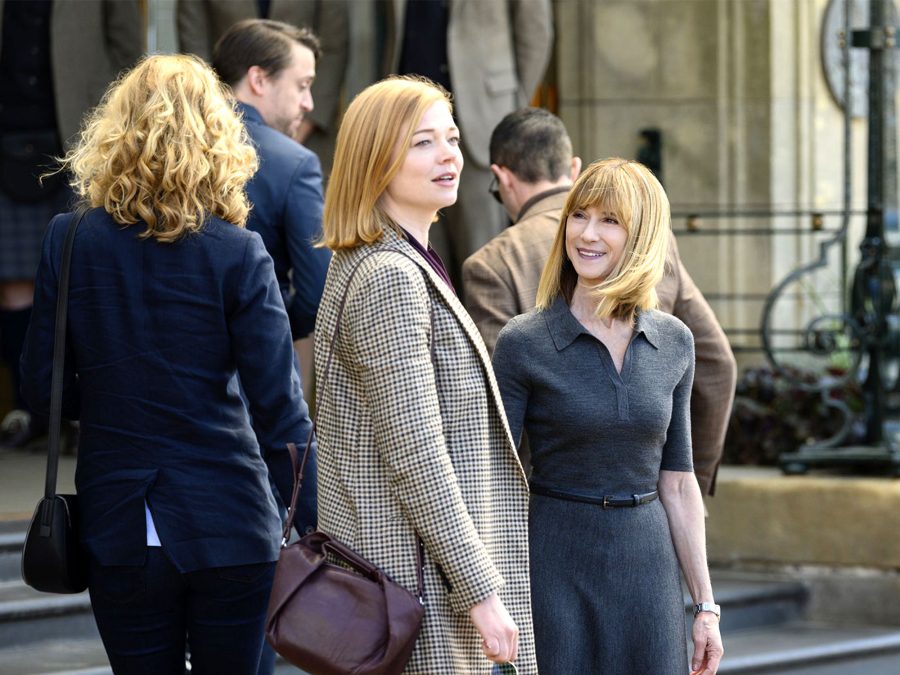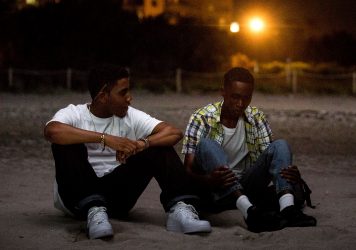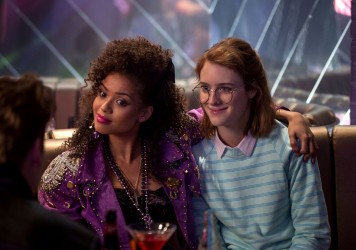
A show about a powerful American media empire run by patriarch Logan Roy (Brian Cox) and his adult children, Succession is couched in luxe bigness and indulgent, melodramatic dialogue. Such traits amplify an undercurrent of desire in a series already charged with a homoeroticism that flies in multiple, erratic directions, like a bouncy ball thrown from one of the skyscrapers featured in the opening credits.
“Would you kiss me? If I asked you to? If I told you to?” are some of the first lines Tom Wambsgans (Matthew Macfadyen) delivers to his cousin-in-law Greg Hirsch (Nicholas Braun), a relative of the Roy children, newly relocated to New York to milk whatever distant nepotism he can. While Greg appears startled by the explicitness of this exchange, the pair develop an alliance/pseudo-friendship over the course of the season. Tom and Greg are regularly shown watching one another. Tom’s touches linger; Greg’s eyes twinkle.
These sensual expressions are echoed through dialogue. Tom and Greg’s conversations frequently reference their mutual desire, so much so that it seems the show’s writers are attempting to underscore it. “Are you trying to seduce me?” Greg jokingly asks at an expensive dinner. A blushing Tom confirms through laughter that he is. When their office is put under lockdown and the two are sequestered in a safe room, Tom disparagingly refers to this as “hiding in the closet.”
This scene highlights Tom and Greg’s potentially romantic interest beyond the physicality of their interactions. When Greg asks Tom if he can spread his wings in a separate department, he tentatively requests a “business open relationship,” recalling Tom’s wedding night conversations about polyamory with his wife Shiv Roy (Sarah Snook). The exchange with Greg, however, has more emotional urgency. Tom begins to cry before throwing water bottles at Greg. “We’re friends!” Greg pleads; “Fuck you!” Tom screams in response.
Loaded language and a simmering yearning are not exclusive to Tom and Greg. In season one, Kendall Roy (Jeremy Strong) meets his old friend Stewy Hosseini (Arian Moayed) in a café to pitch him an opportunity to “come in” to his family business and bail them out of debt. The two banter before Stewy makes an ambiguous gesture with his fist, suggesting they head to the bathroom just like “back in the day.” Stewy’s reference to a past arrangement is a concept that a number of fanfiction writers have interpreted sexually.
The habitual double entendre of Stewy’s dialogue with Kendall re-emerges later in the season. The two frenemies find themselves at an underground sex club, where Stewy asks Kendall if they can “talk somewhere private.” Whether this anticipated privacy refers to sex or drugs doesn’t matter – when it comes to these two, licked donut holes, lines of cocaine, and lavender sprigs sniffed during business meetings evoke the body so strongly that they become carnally coded.
Like Tom and Greg, Kendall and Stewy’s pairing is often framed in terms of a thwarted emotional intimacy. “We had the whole world in our hands and you walked,” Stewy says to Kendall, with the accusatory, affective tenor of a broken heart. Squeezed together in a series of nearly voyeuristic close ups, the pair intimately search one another’s faces as if probing for words unsaid.

On-screen longing between Succession’s female character is more complex, which is hardly surprising given the show’s themes of misogyny and patriarchy. In the second season, Rhea Jarrell (Holly Hunter) briefly joins the cast as Logan’s advisor. While Rhea is first perceived by the Roy children as their father’s seductress, her most potent dynamic is with Shiv. Shiv accepts Rhea’s offer of professional help, which backfires. She calls Kendall and spits into the phone that Rhea “fucked” her; while Shiv means that Rhea fucked her over, this seemingly innocuous delineation is largely expressive.
Shiv becomes obsessed with Rhea and describes the other woman using vitriolic, sexually charged language. Their interest in one another is coated by much denser patriarchal dynamics. Does Shiv want to be like Rhea or does she desire her? Probably both, but for the women who participate in the worldview Succession represents, competition and indifference are conceived as the only relational outcomes.
Key to the show’s approach to sexuality is its hollowing out of the heteronormative ideals that capitalism implicitly promotes. Like Mad Men’s previous exploration of masculine machinations of power, Succession appears to be playing an ambitious narrative long game. Still, the actualisation of any of these aforementioned queer dynamics is unlikely, but this may be part of the point – after all, Succession is ultimately about repression among the super rich and powerful. Because of the system in which they’ve staked out their lives, these “couples” are destined to endlessly betray one another in favour of draconian individualism. Capital smothers authentic connection, which makes Succession’s desiring duos act not only cruelly but also dangerously.
One of Succession’s most devastating scenes occurs during its first season finale. Kendall – who seems a near cipher for the vampiric forces of big money – observes the dance floor at Shiv and Tom’s wedding. Whitney Houston’s “I Wanna Dance with Somebody” (itself a gay anthem) starts to play. The shot widens to capture most of the adult Roy children dancing in slow motion. They’re together but alone, moving in different rhythms or looking in different directions. “I wanna feel the heat with somebody,” Whitney sings. What would it mean for some of these characters to actually connect? In a show where everybody is vulnerable in isolation and actual trust between anyone is unimaginable, it’s in Succession’s unstated queer relationships that this possibility for connection opens up, only to be quickly swept under the rug.
Of course, for Succession to explicitly represent these relationships as gay or queer wouldn’t excuse the terrible actions these characters take. The horrific abuses of power depicted in the show are frankly nauseating. Similarly, while I desperately wish that Kendall and Stewy would share a subversive on-screen smooch, my own queer spectatorship doesn’t absolve me of the moments in which enjoying Succession makes me complicit in its icky politics. The intersection of these spectatorial identities – equal parts desire and antipathy – might be best described by one of Tom’s most telling lines to Greg: “I don’t always like who I am.”
Published 9 Nov 2019

By Josh Lee
By not showing physical intimacy, Barry Jenkins allows sexuality to surface in his film in other ways.

By Thomas Hobbs
Mark Patton opens up about his experiences as the first ever male scream queen.

By Ella Donald
The new season of the dark social satire features a refreshingly tragedy-free queer relationship.